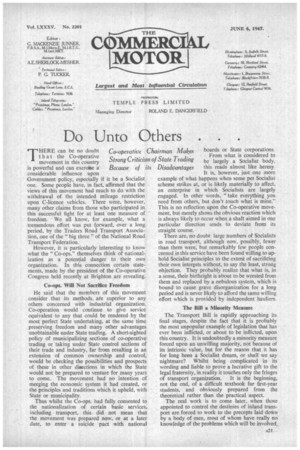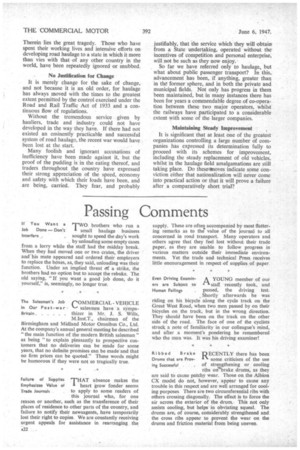Do Unto Others
Page 23

Page 24

If you've noticed an error in this article please click here to report it so we can fix it.
THERE can be no doubt that the Co-operative movement in this country is powerful and can exereige a considerable influence upon Government policy, especially if it be a Socialist one. Some people have, in fact, affirmed that the views of this movement had much to do with the withdrawal of the intended mileage restriction upon C-licence vehicles. There were, however, many other claims from those who participated in this successful fight for at least one measure of freedom. We all know, for example, what a tremendous effort was put forward, over a long period, by the Traders Road Transport Association, one of the "big three" of the National Road Transport Federation.
However, it is particularly interesting to know what the "Co-ops." themselves think of nationalization as a potential danger to their own organization. In this connection certain statements, made by the president of the Co-operative Congress held recently at Brighton are revealing.
Co-ops. Will Not Sacrifice Freedom He said that the members of this movement consider that its methods. are superior to any others concerned with industrial organization. Co-operation would continue to give service equivalent to any that could be rendered by the most perfect State undertaking, at the same time preserving freedom and many other advantages unobtainable under State trading. A short-sighted policy of municipalizing sections of co-operative trading or taking under State control sections of their trade and industry, far from resulting in an extension of common ownership and control, would be checking the possibilities and prospects of these in other directions in which the State would not be prepared to venture for many years to come. The movement had no intention of merging the economic system it had created, or the principles and traditions which it upheld, with State or municipality.
Thus whilst the Co-ops. had fully. consented to the nationalization of certain basic services,.
including transport, this did not mean that • the movement was prepared now, or at a later date, to enter a suicide pact with national boards or State corporations.
From what is considered to be largely a Socialist body, this reads almost like heresy. It is, however, just one more example of what happens when some pet Socialist scheme strikes at, or is likely materially to affect, an enterprise in which Socialists are largely engaged. In other words, "take everything you need from others, but don't touch what is mine." This is no reflection upon the Co-operative movement, but merely shows the obvious reaction which is always likely to occur when a shaft aimed in one particular direction tends to deviate from its straight course.
There are, no doubt large numbers of Socialists in road transport, although now, possibly, fewer than there were, but remarkably few people concerned in this service have been found willing to uphold Socialist principles to the exterit of sacrificing their own interests without, to say the least, strong objection. They probably realize that what is, ,in a sense, their birthright is about to be wrested from them and replaced by a nebulous system, which is bound to cause grave disorganization for a long period and is never likely to afford the same willing effort which is provided by independent hauliers, The Bin 8 Minority Measure The Transport Bill is rapidly approaching its final stages, despite the fact that it is probably the most unpopular example of legislation that has ever been inflicted, or about to be inflicted, upon this country. It is undoubtedly a minority measure forced upon an unwilling majority, not because of its intrinsic value, but for the reason that it has for long been a Socialist dream, or shall we say nightmare? Whilst being complicated in its wording and liable to prove a lucrative gift to the legal fraternity, in reality it touches only the fringes of transport organization. It is the beginning, not the end, of a difficult textbook for first-year students, and obviously prepared from the theoretical rather than the practical aspect.
The real work is to come later, when those appointed to control the destinies of inland transport are forced to work to the precepts laid down by a body of men, most of whom have really no knowledge of the problems which will be involved. Therein lies the great tragedy. Those who have spent their working lives and intensive efforts on developing road haulage to a state in which it more than vies with that of any other country in the world, have been repeatedly ignored or snubbed.
No Justification for Change It is merely change for the sake of change, and not because it is an old order, for haulage has always moved with the times to the greatest extent permitted by the control exercised under the Road and Rail Traffic Act of 1933 and a continuous flow of regulations. • Without the tremendous service given by hauliers, trade and industry could not have developed in the way they have. If there had not existed an eminently practicable and successful system of road haular, the recent war would have been lost at the start.
Many foolish and ignorant accusations of inefficiency have been made against it, but the proof of the pudding is in the eating thereof, and traders throughout the country have expressed their strong appreciation of the speed, economy and safety with which their loads have been, and are being, carried. They fear, and probably justifiably, that the service which they will obtain, from a State undertaking, operated without the incentives of competition and personal enterprise, will not be such as they now enjoy.
So far we have referred only to haulage, but what about public passenger transport? In this, advancement has been, if anything, greater than in the former sphere, and in both the private and municipal fields. Not only has progress in them been maintained, but in many instances there has been for years a commendable degree of co-operation between these two major operators, whilst the railways have participated to a considerable extent with some of the larger companies.
Maintaining Steady Improvement












































































